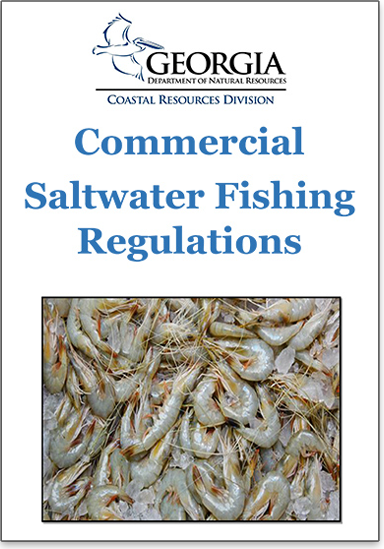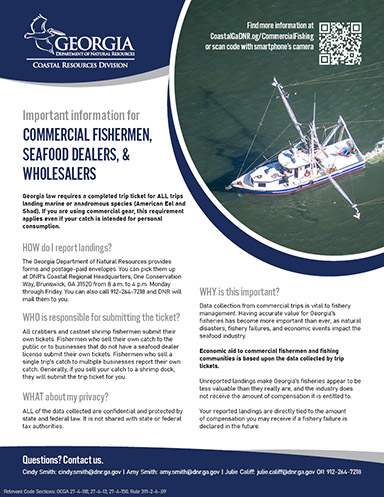

Georgia's saltwater bounty isn't just a delicious treat; it's a vital industry. Commercial fishing for shrimp, blue crab, shellfish, and other marine species weaves itself into the fabric of the coastal economy, supporting communities and livelihoods. These fisheries generate millions annually, providing jobs for harvesters, processors, distributors, and restaurant workers. Beyond economics, these fishermen serve as stewards of the sea, adhering to strict regulations and contributing to sustainable practices. Their catches grace plates across the region, fueling tourism and showcasing the unique flavors of Georgia's waters. From plump shrimp to succulent blue crab, these fisheries offer a taste of the coast, connecting consumers to the ocean's bounty. While challenges like fluctuating seasons and environmental concerns exist, responsible commercial fishing ensures a vibrant seafood industry, nourishing both the economy and the coastal soul.

Fishermen who take finfish or other seafood for commercial sale must possess a valid commercial fishing license and if a boat is used, a commercial boat license. The license must be on your person while fishing (O.C.G.A. 27-4-110). Commercial fishermen must abide by season, creel and size limits when harvesting any of the finfish for which the Georgia General Assembly or the Board of Natural Resources (Board) has created regulations. However, individuals fishing with a valid federal commercial fishing permit in federal waters may exceed the creel limits provided those waters are open for commercial fishing with specified gear, minimum size limits are observed, the quota has not been met, and the Board has not prohibited sale of the species. Finfish for which there are minimum sizes and/or creel and possession limits must be landed head and fins intact. Transfer at sea is prohibited. (O.C.G.A. 127-4-130.1)

Georgia law requires a completed trip ticket for ALL trips landing marine or anadromous species (American Eel and Shad). If you are using commercial gear, this requirement applies even if your catch is intended for personal consumption. This flyer provides information about how to report landings and who is responsible, why it's important, and who you can contact with questions.
Why is this important? Data collection from commercial trips is vital to fishery management. Having accurate value for Georgia’s fisheries has become more important than ever, as natural disasters, fishery failures, and economic events impact the seafood industry.
Economic aid to commercial fishermen and fishing communities is based upon the data collected by trip tickets. Unreported landings make Georgia’s fisheries appear to be less valuable than they really are, and the industry does not receive the amount of compensation it is entitled to.

Coastal Regional Headquarters
One Conservation Way
Brunswick, GA 31520
912-264-7237
2024 Commercial Fishing License Application Packet For licenses effective April 1, 2024 to March 31, 2025
When purchasing in person, remember to bring:
![]()
Mail your application to DNR Law Enforcement, One Conservation Way, Brunswick, GA 31520
When purchasing by mail, be sure to include:
When purchasing a license by email, be sure to follow the same steps as required for mailing your application via U.S. Postal Service. A PDF scan is the preferred method of receiving emailed applications. Remember to fill out the debit/credit card authorization and add $5 to the base fee for each license.
2024 Saltwater Guide License Application Packet For licenses effective April 1, 2024 to March 31, 2025
This license is required by any person or entity, other than the end-consumer, who purchases seafood products from a harvester unless the harvester is a licensed seafood dealer. Reporting requirements apply: This license and distinct and separate from seafood dealer’s licenses issued by other agencies.
An optional license covering all crew members aboard a food shrimp trawler while fishing. Crew members are exempt from the personal commercial fishing license and endorsements only while aboard a vessel operating with a valid crew license. This license is only valid for the vessel for which it is purchased and is not transferable.
Endorsements are required of licensed commercial fishermen harvesting or landing any of the species listed below. If the vessel has a valid trawler crew license no license or endorsement is required for the crew while landing and harvesting those species with a “yes” in the “Covered by Trawler Crew License” column.
Species
Endorsement Requirements
Covered by Trawler Crew License?
Required for harvesters. Cashiers not actively harvesting are exempt
Required for harvesters. Cashiers not actively harvesting are exempt
Required to harvest or land. The vessel captain or owner must have a purchasing agreement with an approved buyer on file with the Coastal Resources Division
Catfish in Saltwater
Required for harvest or landing in saltwater. Not required for freshwater harvest
Required for employees of licensed commercial crabbers, soft shell dealers, and trawler crew
Required to harvest eels
Required to harvest finfish, including trawl-caught fish, OTHER than shad, catfish in saltwater, and bait minnows.
Required for employees of licensed commercial shrimp castnet harvesters and trawler crew
Required to harvest or land, including trawler crew
Required to harvest or land
Required for master collection permittees and employees actively involved in harvest or landings of shellfish
Required to harvest or land whelk, including trawler crew
Licenses are valid from April 1 to March 31 of the following year. There is an additional $5 transaction fee per license.
Commercial Fishing License